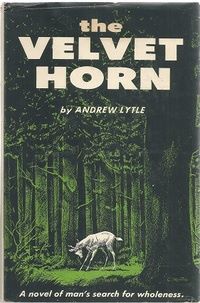A lesser known member of The Fugitive Group at Vanderbilt, Andrew Lytle later emerged as a significant member of the Agrarians who wrote and published I’ll Take My Stand in 1930. His essay, “The Hind Tit,” one of the best in the collection, praises small-farm owners, like some who still live and work in our Shenandoah Valley. Of the essay, Jon Meacham writes, Lytle “made a case for preserving the economy, habits, and values of the farm and small town.” Dying in his cabin at Monteagle, Tennessee in 1995, Lytle was the last of the Agrarians, but as Meacham asserts, “His art is indeed universal, and will endure.”
Lytle wrote few novels (only four) and even fewer short stories (three important ones); however, his novel, The Velvet Horn, is one of the best Southern novels of the second half of the 20th century. Lytle also made major contributions as a literary critic, editor, and influential professor of creative writing. He established the MFA program at the University of Florida, where his students, among others, included Harry Crews, Madison Jones, and Sterling Watson. Earlier at the University of Iowa, Lytle was a mentor to Flannery O’Connor, describing her as so talented that the male members of the Workshop were “afraid of her.”
Andrew Lytle was born in Murfreesboro, Tennessee into a family that had lived in Tennessee since around 1790. Lytle Street in Murfreesboro bears the name of his ancestor, William Lytle, originally from Hillsboro, NC. The family plantation was Cornsilk in Cross Plains, Tennessee. Lytle tried, unsuccessfully, to put his Agrarian ideas into practice at the farm in the 1940s; however, he was finally more adept at the literary than the agricultural.
Though he published a poem or two in The Fugitive during his time at Vanderbilt, Lytle was then more interested in drama. After his graduation from Vanderbilt in 1925, he moved North and entered Yale where he studied drama and playwriting. His friend Allen Tate lured him to New York where he acted in plays and had a one-act play, The Lost Sheep, produced.
By the end of the 1920s, however, Lytle had returned to the South both literally and intellectually. He published his first book, a biography of the Confederate general Nathan Bedford Forest in 1931.Through the 1930s and 40s, Lytle pursued his literary career along with stints as a professor. His first novels were The Long Night (1936), At the Moon’s Inn (1940), and A Name for Evil (1947). Ten years passed before Lytle published The Velvet Horn (1957), the novel he himself considered his most important work.
When the novel came out, reviewers praised the novel for its broad scope, its complexity, and unique style–some even compared it with James Joyce’s Ulysses. In addition to telling an enthralling story, Lytle included much experimentation in the novel, including what he called a “roving” narration, a technique which sometimes evolves into use of the stream-of-consciousness. He divided the novel into a number of self-contained sections, introduced an intricate pattern of symbolism, and includes many literary allusions.

A year after he published the novel, Lytle wrote an essay, “The Working Novelist and the Mythmaking Process,” in which he explains how he wrote the novel. He says his first plan was to write a novel about a dead society, that of the Old South, but he soon realized that his characters and their interactions were more important than historical representation. Basically, then, the novel becomes a study of four siblings, the Cropleighs, who lost their parents too early and suffered ruin, both external and internal. Lytle uses Edenic references to show their retreat from the reality of loss: “[They] withdraw from the stresses of formal society in an effort to return to the prenatural equilibrium of innocence and wholeness.” Only the second brother, Jack, manages a semblance of normality, acting as the moral center of the novel, but his knowledge of family tragedy ultimately proves fatal.
Lucius Cree, the son of Julia, the only daughter among the Cropleigh siblings, exists at the center of the novel. From his perspective, the novel is a work of initiation, of his growing up in what he perceives to be a perfect upper-class environment, only to learn that that environment has been an illusion. Through traumatic experience, he must face the reality of a life that transcends the boundaries of reputation and class.
Lytle’s treatment of the female characters in the novel seems Biblical. Besides Julia, Lytle created two other women: Amelie, a sinister widow, briefly married to Duncan (one of the Cropleigh brothers), and Ada Belle Rutter, who becomes Lucius’s underclass lover and later wife. These three can be read as evocations of the Biblical Eve: Julia emblemizes the prelapsarian Eve, Amelie is Lilith-like in her evil, while Ada Belle emerges as Lytle’s most positive version of Eve, a woman able to live in a fallen world.
Thomas Landess writes, “After finishing The Velvet Horn, the reader is overwhelmed by the sheer scope of experience and sensibility which went into the making of the novel.” The Velvet Horn is definitely not a “beach read,” but exploring its complexity is well worth the effort.





































